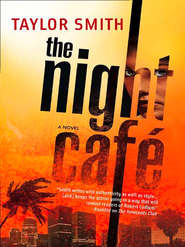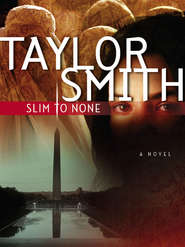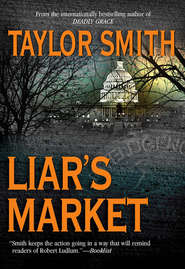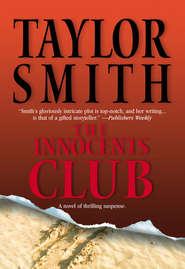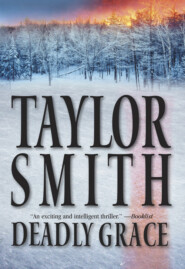По всем вопросам обращайтесь на: info@litportal.ru
(©) 2003-2024.
✖
Guilt By Silence
Автор
Год написания книги
2018
Настройки чтения
Размер шрифта
Высота строк
Поля
She leaned back and massaged her temples, then glanced at her watch. Propping her feet on the coffee table, she grabbed the television remote and flicked on the ten o’clock news. As the screen began to glow, two figures came into view—the “CBN Nightly News” anchors. They fit the standard TV-news format. The man, Bob Michaels, was in his mid-forties, telegenic, conservatively dressed, sober. Beverly Chin, by comparison, was younger, more brightly dressed and seated on the right side of the screen, where the eye is naturally drawn. She smiled a great deal, although her face became serious when she read from the TelePrompTer. Her Chinese features and the good looks of the African-American weatherman brought a politically correct racial balance to the news team.
The newscast opened with the latest on the aftermath of a terrorist triple-header that had occurred three days earlier. Forty-seven deaths and scores of injuries had resulted when bombs had exploded simultaneously in London’s Trafalgar Square, Paris’s Eiffel Tower and at the Statue of Liberty in New York. The horrifying brilliance of the attacks—their stunning coordination and the pointed symbolism of the three targets, all objects of intense national pride—was such that dozens of groups had jumped in to claim responsibility and threaten further action if their demands were not met. A coordinated intelligence effort had narrowed the field of probable attackers to one fundamentalist religious group and two “liberation fronts.”
Mariah watched the item closely. Now that the Soviet Union was defunct, she had been assigned a new focus of analysis. She was in the middle of drafting a paper on the arms market for interconnected terrorist groups and she thought she might have uncovered a new supplier with possible links to Libya. There was no evidence of a connection to this ghastly terrorist triple play—not yet, anyway—but she was determined to keep at it, knowing that a coordinated assault like this had to have had strong and experienced backing.
The news report, however, told her nothing she didn’t already know. When it ended, the screen shifted back to the grave features of anchorman Bob Michaels.
“The Cold War may be over, but there seems no end to troubles in the former Soviet Union. There was rioting again today in the streets of Moscow, as another cold Russian winter sets in and food shortages loom large. Correspondent Paul Chaney reports that some cash-strapped Russians may become desperate enough to try to sell the country’s nuclear arsenal.”
Mariah’s heart began to pound. She leaned forward in her seat as the tall, lean figure of Paul Chaney appeared on the screen, standing in front of the State Department building. He was wearing a sport coat and tie instead of the habitual bomber jacket—his concession to the camera. It looked as if the report had been videotaped earlier in the day.
“Since the end of the Cold War, the Russian and American governments have agreed to drastic cuts in nuclear arsenals. Thousands of weapons researchers have seen their funding disappear as the former superpowers cut weapons programs to cash in the promised ‘Peace Dividend,’ freeing up military funds for domestic purposes.
“But there are those who would be willing to pay a high price for these cast-off weapons—and for the experts to operate them. In Vienna, the International Atomic Energy Agency—the IAEA—has been fighting for more power to inspect nuclear weapons sites to ensure that these arsenals are destroyed as promised. The IAEA has also proposed a registry of nuclear scientists to make certain that these specialists don’t auction off their skills to the highest bidder.
“I asked an official here at the State Department why our government has not been more supportive of the IAEA’s efforts.”
The scene shifted to an office, where a white-haired man in a pin-striped suit sat, hands folded, behind a desk. A line on the screen identified him as William Hoskmeyer of the State Department’s Nuclear Affairs Division. Mariah knew him well—he was a pompous idiot.
Hoskmeyer: “I think you have to see it as a question of equity. If we insist that the Russians allow snap inspections by outsiders of their nuclear facilities, then they have every right to insist that we do the same. Frankly, we’re not prepared to do that—to give foreigners unrestricted access to American security installations.”
Chaney: “So how do we know that Russian weapons and expertise won’t end up in the pockets of madmen and terrorists in exchange for much-needed dollars?”
Hoskmeyer: “Because Moscow is as committed as we are to nuclear nonproliferation. We’re confident that the agreements on force reduction that we’ve struck with the Russians will be fully respected—both the letter and the spirit. And we’re monitoring closely, of course.”
The scene shifted back to Chaney in front of the State Department building. “Despite Washington’s apparent lack of concern, there is evidence that unstable governments and terrorist groups are scrambling to acquire nuclear weapons—and that whistle-blowers in the IAEA are being silenced. Some of these potential customers can pay top dollar for smuggled nuclear weapons and the specialists to handle them. If they succeed, we may find ourselves looking back fondly on the Cold War—when only Moscow and Washington appeared likely to blow up the planet.
“Paul Chaney—CBN—Washington.”
The news continued, but Mariah wasn’t listening to the television anymore. She snapped off the set, staring numbly at the disappearing glow.
David had been working in Vienna for the International Atomic Energy Agency and had been in the forefront of IAEA officials seeking greater powers to stop the spread of nuclear weapons—and Paul knew it.
But what Chaney couldn’t know was that it was Mariah herself—not David—who had blown the whistle on a suspected nuclear weapons ring. And that if David and Lindsay’s accident in Vienna had been an attempt to silence a whistle-blower, it should have been Mariah—not David—who was the target.
“But it wasn’t,” Mariah whispered. “Dammit, Chaney. I would have been the first to know.”
No one could have guessed that the five men at the corner table were doomed.
They were sitting in the Trinity Bar (“Live Country Music Every Nite!”) just on the outskirts of Taos, New Mexico. Around them, the usual Wednesday-night crowd of ranch hands and laborers, most in jeans and Stetsons, moved through the smoky haze to the rhythm of a steel guitar. At the front of the bar, a singer in a fringed shirt stood under a spotlight, his throaty twang straining to be heard as he begged Ruby not to take her love to town.
Admittedly, the three Russians were a little conspicuous. In the crowd of sweat-soaked Stetsons and dust-lined faces, their crisp Levi’s marked them as dudes. And the new white cowboy hats looked incongruous above round Slavic faces. The two Americans with them seemed drab by comparison: rumpled corduroy pants, casual shirts and down ski jackets. The younger one—thirtyish maybe—wore wire-rimmed glasses patched at the nosepiece with adhesive tape. The other man was in his fifties, white-haired, with a weary countenance.
Five matching black leather briefcases on the floor under the table provided the clue to the brotherhood that united the men. Each case bore a gold-lettered inscription stenciled in the corner: Los Alamos National Laboratory. Their obituaries would note how the five former enemies perished together just at the moment they had joined forces to put their scientific genius to work for the benefit of mankind.
A tired-looking waitress, eyes ringed with black mascara, bleached hair teased and sprayed to defy the law of gravity, balanced a tray on her hip as she deposited another round of drinks on the table and cleared the remains of the last round. Five pairs of eyes were fixed on the low neckline of her ruffled white blouse each time she bent over to put down or pick up a glass or bottle. “That’s five Coors and four vodkas straight up, right, boys?” she said, straining to be heard over the music.
“But Russian vodka, yes?” Blue almond eyes sparkled in a flushed round face, watching the topside of her breasts roll with her up-and-down movements.
The waitress raised her eyes heavenward and nodded without breaking the rhythm of her work. “Yeah, yeah—Smirnoff—good Russian vodka.” The two Americans at the table exchanged amused glances. “That’s twenty-four-fifty, fellas.”
Larry Kingman dropped a twenty and a ten on her tray. Once again, as he had on the last two rounds, he waved away the change she had begun to count out.
“Well, thanks! Thanks a lot,” the waitress said, taking a real good look at him now and smiling warmly. “You just holler if you need anything else, okay?”
Kingman smiled and nodded. The woman lingered a moment, then wandered reluctantly over to a table where some good ol’ boys were calling loudly for refills. Kingman raised one of the shot glasses of vodka and held it out over the center of the table, looking at each of the other four faces in turn. “To the future, gentlemen. To science.”
The Russians lifted the three remaining shot glasses. “Na zhdoroviye,” they said in unison, tossing back the clear liquor, then slapping the glasses down on the stained wooden tabletop and reaching for the beer chasers.
Kingman directed an inquiring eyebrow at the younger American seated next to him. Scott Bowker was frowning, but he grasped one of the beer glasses, touching it briefly to his lips. Kingman shook his white head as he watched the younger man. “What’s up?”
Bowker glanced at the Russians, then around the room. “We shouldn’t be drinking like this.”
Kingman leaned back in his chair and smiled indulgently. “Relax, Scotty. We’ll let you be designated driver, okay?” Bowker’s frown deepened even further. “Re-lax,” Kingman repeated. “Everything is under control. Now, enjoy.”
One of the Russians, at Bowker’s left, grinned and put an arm around his shoulders, squeezing good-naturedly. “Larry is right. Enjoy! We are allies now—comrades in a common struggle. The Cold War is finished and we, my serious friend, have all won. Now,” he added, “we work on the same side.” The Russian raised his glass and nodded above the brim before taking another swallow of beer. The others echoed his nod. Scott Bowker looked pointedly at his watch, then at Kingman.
“Yup,” Kingman acknowledged. “It’s getting late. We should be going, boys. Tomorrow’s a big day.”
The five men drained their glasses, then stood and gathered up their briefcases. Kingman shifted uncomfortably, stretching out knees that were stiff and swollen after three days of playing guide for the Russian visitors. He trailed the others to the door, offering a nod and a warm smile as he limped past the blond waitress.
“’Bye now,” she said, giving him a wistful wave. “You come again, okay?”
They walked out of the beer-and-smoke fog of the tavern and into the cold night air of the New Mexico desert. The parking lot was full: pickups and old beaters, a few motorcycles, gaudy yellow license plates proclaiming New Mexico—Land of Enchantment. Kingman tossed a set of keys to Bowker as the men approached a minivan. Bowker unlocked the doors and the Russians slipped into the back seats. Kingman shut the sliding rear door and climbed into the front passenger seat.
They pulled out of the parking lot and turned south on NM 68, the main highway linking Taos and Los Alamos. The men fell silent, contemplating the landscape eerily lit by a cloud-draped moon over the Sangre de Cristo—the Blood of Christ—Mountains. A powdery snow had been falling while they were inside and it muffled the sound of the tires on the road. The Pueblo Indians believe that the spirits of the dead linger on the mesas of New Mexico, guarding the land. In this spectral glow and eerie silence, it was easy enough to believe that ghosts were hovering nearby. Watching and waiting.
The highway curved along the banks of the Rio Grande, hugging the line of the rushing river. It was past midnight and the road was virtually deserted. As the van sped along toward Española and the Los Alamos turnoff, a single pair of lights could be seen approaching from far off, flashing between the hills.
Kingman rolled down his window, the wispy white strings of his breath escaping into the night. He inhaled deeply, drinking in the cold, fresh air—infinitely preferable to the hops-and nicotine-soaked atmosphere of the Trinity Bar. Then he rolled the window up again and glanced back at the men in the rear of the van. The two Russians on the rear-most bench were heavy-eyed, their heads lolling with the motion of the vehicle, on the edge of dropping off to sleep. But Yuri Sokolov, sitting on the center bank of seats, had his gaze fixed on the road ahead, his thoughts impenetrable but obviously stone-cold sober, despite his consumption at the Trinity Bar.
At fifty-two, Sokolov was acknowledged in the arcane world of nuclear physics as the most brilliant mind in the field. Until recently, of course, his reputation in the West had been based entirely on the discoveries of meticulous spycraft, since he had never before stepped outside the Soviet weapons community, nor knowingly circulated a paper in the West.
Sokolov glanced briefly at Kingman, then focused again on the road ahead, watching the snow spinning through the van’s headlights—remembering Moscow nights, perhaps. They were intellectual brothers, Kingman reflected, forced to live their lives as enemies until suddenly, one day, someone had decided to change the rules. Now they had a common purpose—always had, maybe. The vagaries of politics irritated him. There was neither method nor reason to human behavior, and politicians were more irrational than most. Only science was constant, sane.
The single set of headlights rolling north on NM 68 toward the van belonged to a tanker truck making a night run to Taos. Diamond-shaped plaques on the tanker noted the contents as gasoline—hazardous material, highly flammable. The rig was hauling over eight thousand gallons of unleaded fuel and doing sixty on the open road.
When the two vehicles collided, the explosion could be heard all the way to Taos. The fireball rose eighty feet into the air, lighting up the night sky, although the only immediate witnesses to the event were jackrabbits and owls. The heat generated by the fire was enough to twist steel into Silly Putty and incinerate anything else unfortunate enough to be caught in the vicinity. Within a matter of seconds, even the asphalt road was ablaze.
Another car traveling south on NM 68 came upon the accident six minutes after the collision. After realizing that nothing could have survived the inferno, the driver turned back toward Taos to telephone for help from the Trinity Bar. When the emergency vehicles arrived, there was nothing they could do but try to keep the blaze from spreading to the surrounding juniper and piñon trees. It took three hours for the fire to burn itself out. Fire fighters doused the site with foam to guard against another flare-up, but this only served to seal the tomb.
The next day, curiosity seekers from both sides of the closed highway swarmed over the hills for a look, but nothing was left at the scene except a surreal metal sculpture, smoldering ash and the stench of burnt rubber.
A piece of evidence that had miraculously survived the impact of the crash and resulting blaze—the van’s rear license plate—allowed state police to trace the ownership and determine that it had been signed out to Dr. Lawrence Kingman, deputy director of the Los Alamos National Laboratory, who had been squiring around some scientists visiting New Mexico under the Russia/U.S. Nuclear Cooperation Pact. Someone at Los Alamos remembered that Kingman and a few others attending a dinner at the Hilltop House Hotel earlier that evening had headed down the mesa for drinks afterward.
The police spoke to a waitress at the Trinity Bar who clearly remembered the group and was able to confirm that there had been three Russians and two Americans. The Russkies had been obvious, she’d said, rolling her eyes at the memory of the new cowboy getups they had worn. The table had ordered several drinks over a couple of hours, although they hadn’t been staggering or anything when they left. She was really sad to hear about the accident—the older American had seemed like a good guy.
The federal government took a close interest in the follow-up investigation and insisted that the van and the remains of its occupants be returned. The coroner explained that anything they scraped off the melted highway would consist primarily of American automotive technology and very little by way of identifiable human remains. Investigators were sifting through the rubble, but the blaze appeared to have made as effective a funeral pyre as any crematorium could boast, if a little less tidy.






